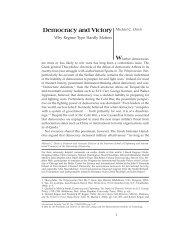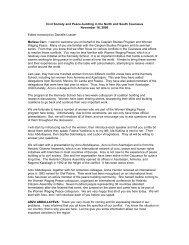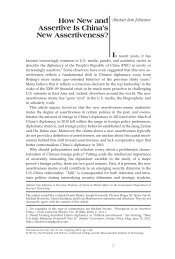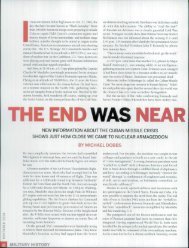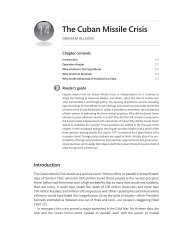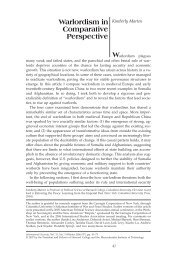The Cuban missile crisis and intelligence performance
The Cuban missile crisis and intelligence performance
The Cuban missile crisis and intelligence performance
You also want an ePaper? Increase the reach of your titles
YUMPU automatically turns print PDFs into web optimized ePapers that Google loves.
Downloaded by [Harvard College] at 08:23 18 September 2012<br />
196 INTELLIGENCE AND THE CUBAN MISSILE CRISIS<br />
trivially easy for analysts working with the benefit of hindsight to construct<br />
explanations of Khrushchev's behavior that conformed with their<br />
preconceptions. Some of these retrospective assessments cut the Gordian<br />
knot simply by assigning blame to Khrushchev for failing to appreciate the<br />
nature <strong>and</strong> intensity of American concerns about Soviet forces in Cuba, or<br />
for overestimating the likelihood that a covert deployment might succeed.<br />
<strong>The</strong> current record shows that Khrushchev erred, but it is interesting to note<br />
that these retrospective assessments - while in this respect quite accurate -<br />
themselves made various indefensible logical leaps. Knorr, for example,<br />
making use of a constructive distinction between technical <strong>and</strong> behavioral<br />
surprise (that is, surprise that results because someone succeeds in fooling<br />
us, <strong>and</strong> surprise that succeeds because it is, or seems to be, inconsistent with<br />
our set of expectations), 74 concludes that there was nothing wrong with the<br />
set of expectations about Soviet behavior prevalent in the US <strong>intelligence</strong><br />
community in 1962, <strong>and</strong> that the Stennis Report erred in finding fault with<br />
it. Instead, Knorr considers the failure to anticipate the deployment a case<br />
of 'apparent behavioral surprise', where the USSR seemed to have adopted<br />
a course of behavior that was inconsistent with US expectations, but, in fact,<br />
was not. In support of this conclusion, Knorr reasons that the lengthy period<br />
of planning <strong>and</strong> preparation that must have been involved in the deployment<br />
was 'not conducive to a strong component of emotional or irrational<br />
decision-making', <strong>and</strong> that Moscow's underestimation of the risk of the<br />
deployment can most probably be attributed to Soviet <strong>intelligence</strong> failure. 75<br />
Knorr is undoubtedly correct to suppose that there were Soviet <strong>intelligence</strong><br />
failures; but we now know that the Soviet mistake was over-determined,<br />
<strong>and</strong> that emotional or 'irrational' factors most certainly played a role.<br />
Other retrospective assessments downplayed Soviet errors <strong>and</strong> quite<br />
creatively constructed a set of beliefs on the basis of which Khrushchev<br />
'must' have been operating that would have made the covert deployment<br />
appear to be a rational gamble. <strong>The</strong>se are interesting because they managed<br />
to preserve three key assumptions: (1) that Khrushchev was aware of the<br />
nature <strong>and</strong> intensity of the American interest in Cuba; (2) that Khrushchev<br />
would not behave fundamentally differently from his predecessors; <strong>and</strong> (3)<br />
that Khrushchev would not accept a poor gamble. <strong>The</strong>se explanations<br />
typically relied heavily (for example) on the claim that Khrushchev had a<br />
low estimate of Kennedy's resolve - because of his youth, his 'liberalism',<br />
his failure to follow up the Bay of Pigs disaster with full-scale American<br />
intervention, his overly-intellectual <strong>performance</strong> at the 1961 Vienna<br />
summit, <strong>and</strong> so on - <strong>and</strong>/or the claim that Khrushchev thought that his<br />
stranglehold on Berlin gave him the leverage he needed to force Kennedy<br />
to accept a nuclear <strong>missile</strong> deployment in Cuba. <strong>The</strong>se assessments also<br />
make enormous logical leaps, egregiously demonstrating the fallacy of




